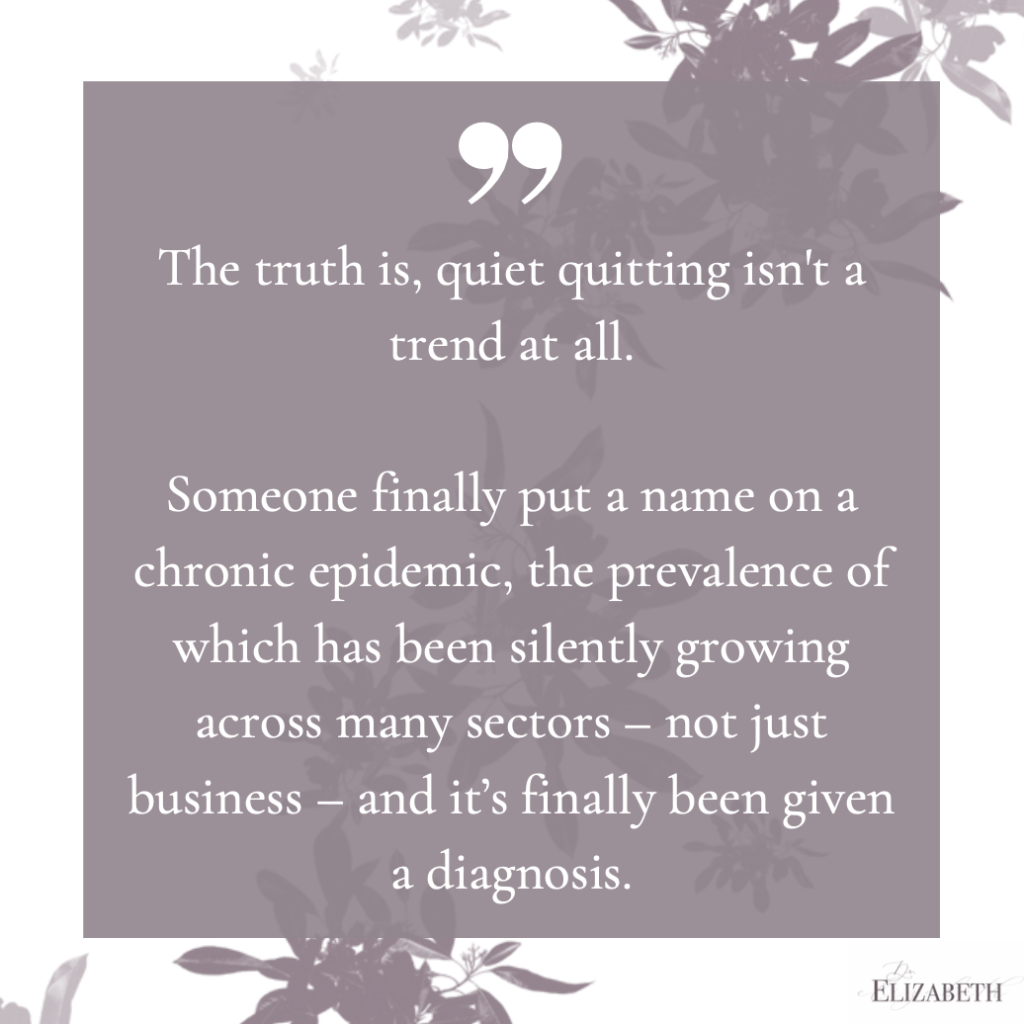I'm Dr. Elizabeth
EPIDEMIOLOGIST TURNED HOLISTIC HEALER, MEDICAL INTUITIVE AND YOUR HEALTH ISSUES’ WORST NIGHTMARE
welcome!
Download the free guide
follow along!
LEARN MORE
10 Hidden Household Toxins Sabotaging You and Your Family’s Health
search the blog
How to Get to the Root Cause of Quiet Quitting
September 30, 2022

“Quiet quitting” is a trend in the corporate business world that we’re all hearing about.
Nearly every media outlet is sharing their two cents on quiet quitting. Even late-night talk show hosts are speculating what this means, what the outcome is going to be, and who’s to blame. The perception that’s been created is people are choosing to sit at work and do nothing.
But in reality, people are simply putting in the bare minimum required by their job descriptions instead of quitting, and calling it a day. Why go above and beyond to collect the same paycheck?
How many people out there have been quiet quitting for their entire careers and merely surviving their jobs just like this? I know it’s more than a few. Given that it’s all over the media, I’d bet that the prevalence of quiet quitting has been growing for decades and the number of people who are silently suffering at work is increasing to the point that it’s out of hand.
And at what cost?
As more people give in to this way of showing up at work, the business as a whole suffers. This trend of quiet quitting is something I was doing in my job over 5 years ago – and I wasn’t the only person on my team who was doing it.
It’s time to move beyond the speculations and finger pointing we’re seeing in mainstream media articles and get to the root cause of quiet quitting. People that value the work they do want to put value into the world, and they want to know they’re valued for doing it – including by their employers.
The truth is quiet quitting isn’t a trend at all.
Someone finally put a name on a chronic epidemic, the prevalence of which has been silently growing across many sectors – not just business – and it’s finally been given a diagnosis.
The media puts the blame on Gen Z’s and makes them the scapegoat for creating this quiet quitting problem.
Well, I’m not a Gen Z, and neither are the colleagues I worked with on my research team at a health insurance company for several years.

I got my PhD and left academia to go to work for a health insurance company because I thought that was the way I’d be able to help people. I was determined to make a difference so I could help people in the real world improve their health and lives.
I was hired to apply my scientific and research skills to create ideas to improve the health of large groups of people – and I was excited.
Like so many of us do, I went above and beyond, I stayed late listening to my boss drone on in his office, and I even applied (and was accepted) to a prestigious program at Harvard to do additional training – all outside the scope of my job requirements.
For months, then years, I was told my ideas were good, but that they didn’t produce a short term return-on-investment, even though they produced long term health benefits for many vulnerable people.
I had enough.
So, I started quiet quitting.
I put in my 8 hours and not one minute longer. I replied to emails, showed up at meetings, and simply went through the motions to collect my paycheck.
It felt like my soul was getting sucked out of me – “how did I get here?” I often found myself wondering.
Becoming a quiet quitter had nothing to do with my desire to “do less” just to make money. It had to do with the fact that I didn’t feel valued. I was falling on deaf ears no matter what executive level at the organization I spoke to.
One of the medical directors I tried to connect with for support literally took naps in their office during work hours – that was when I knew I could continue to work my ass off for nothing, or I could follow her glowing example.
I did just that. But it wasn’t what I wanted. I wanted to use my passion and expertise to make a positive difference.
Here’s the thing – quiet quitting has been going on in business organizations for decades, maybe longer.
It isn’t just a trend – it’s a chronic problem.
There’s a ripple effect to quiet quitting – after all, everything is connected.
As people sacrifice their happiness and well-being at work, their co-workers start to notice. They may feel more inclined to start quiet quitting too, because they actually value their colleagues so they listened to why they adopted this strategy.
One by one, more of your employees will start quiet quitting too – and all it takes to start the ripple effect is one person.
Quiet quitting is like a drop of water in a pond. That one little drop starts a ripple that spans across the entire surface of the water.
If you’re seeing quiet quitting in your business organization – there’s a root cause that needs to be identified.
Einstein taught us that “you can never solve a problem on the same level at which it was created”.
We’re not going to solve the problem of quiet quitting by using social media or statistics to point out who started the problem- like 20-somethings who entered the workforce during the pandemic, women, or people from under-represented communities; or pointing the finger at who’s to blame – like bad bosses.
It’s time to get to the root cause of this quiet quitting problem and make a change.
I’m a PhD epidemiologist. I’m a chronic health expert and I work with both individuals and organizations to get to the root cause of their health problems. And make no mistake, just like an individual can get sick, so can a company.
What is root cause healing?
Root cause healing means identifying what is really creating and contributing to the chronic symptoms and health issues people are experiencing so that we can create a plan to minimize or eliminate them. For example, inflammation isn’t a cause, it’s an effect. There are several different factors that are creating that inflammation. It’s my job to figure that out.
Spoiler alert – it’s never just toxins and pathogens that are creating a chronic health issue. That’s one side of the healing equation. Root cause healing that actually leads to optimal health and well-being that lasts, means looking at both sides of the equation: physical and non-physical.
When you look at the problem by addressing both sides, you can help people finally look and feel their best at any age.
Now let’s apply this same concept to your organization. How can we get to the root cause of quiet quitting so that we can actually find a pathway to heal our businesses?
First, you need to talk to the quiet quitters. They already feel like they’re not valued, so ask them why. Connect with them and listen to them. Really listen.
You cannot identify the root cause of any problem unless you know the story of how the problem was created to begin with – that’s what you can learn when you listen to the quiet quitters. Give them their voice back.
Once you know the story, you can start to determine the root causes. This requires you to look at both sides of the healing equation, just like I do in my private practice.
On the physical side of the equation – what actions have you, others, or the organization taken that have helped to create this problem? Remember – there is never just one root cause. This is going to require some self-reflection of everyone and the business as a whole. The deeper you dig, the better your results will be.
On the non-physical side of the equation – what led to the actions that helped create the quiet quitting problem? What other factors impacted the overall well-being of your organization that eventually created this quiet quitting issue? What beliefs, stories, and attitudes contributed to the development of the problem?
Find the answers to these questions for yourself as an employer or employee, and for the organization. It’s often the case that things that happened in the past, perhaps before your time at the business, laid the foundation for this problem to start.
Diagnosing a problem and healing a problem are two different things.
Businesses that simply try to diagnose the quiet quitting problem rather than determining its root cause only perpetuate the problem.
When I was working at the health insurance company, over time my entire team started quiet quitting. These were all brilliant and innovative people who truly wanted to help people and make a positive difference in their lives. We hung in there together for as long as we could take it. No one ever bothered to talk to us to figure out the root cause, and eventually over the course of one year – we all left the company.
The only way to stop the problem and solve it so you can create change for the better – is to find the root cause.
When someone who’s quiet quitting finally feels valued, they’re going to want to put value back into their work and the world again. That one little drop in the water, changes the entire ocean.
Businesses and organizations will thrive because they created an optimal work environment for everyone, not just for themselves or their bottom line. People will embody the mission and values of the companies for which they work – and they’ll want to spread that message.
Those that are served by the organization will quite literally feel the difference in the quality of the products or services they receive, and most importantly – in the interactions they have with the people who provide them.
ROI’s will inevitably benefit as a result. Now instead of putting money and work inside the same box, money gets to be the reward that comes from the incredible value people are putting into themselves and the work they do.
And each and every one of those former quiet quitters? Now they’re able to sustain their optimal happiness and well-being while doing their work – and the positive possibilities become limitless. Businesses no longer struggle for new ideas and innovation, because it’s pouring out of their people organically, effortlessly. That energy is now going into all that we do, and we take it out into the world when we leave work. Which ripple effect do you want to create?
If you’re experiencing the problem of quiet quitting, or other symptoms affecting your organization’s health, I can help you find the root cause and create a pathway to healing. I’m Dr. Elizabeth Rodgers, and you can schedule a discovery call here.
Leave a Reply Cancel reply
© 2021-2025 Healthy Transformations with Heart, LLC
HIGHER HEALTH StartS Here
Home
follow along
Info
Work With Me
Services
Speaking
Podcast
Contact
Website designed by Lauren Taylar
© 2021-2025 Healthy Transformations with Heart, LLC | Website designed by Lauren Taylar | Website Disclaimer | Privacy Policy
Join the Newsletter
About
Publication
Research